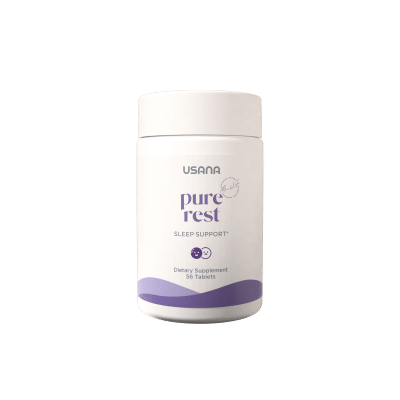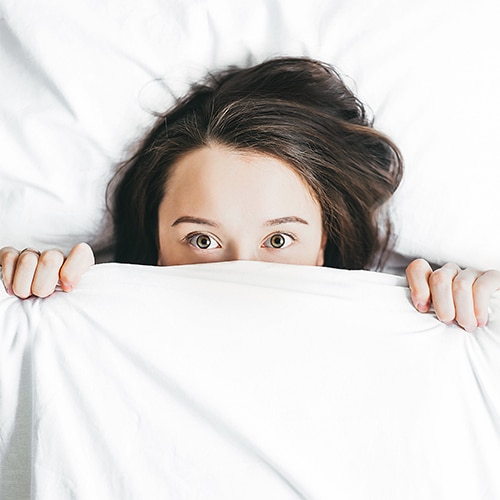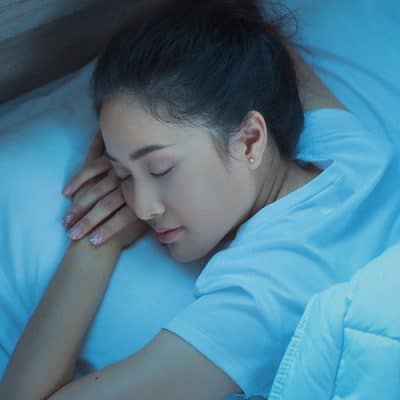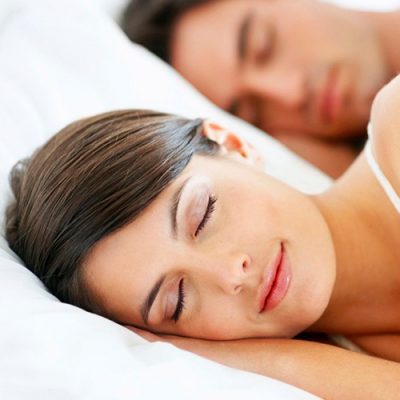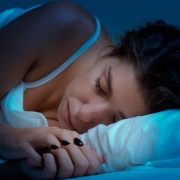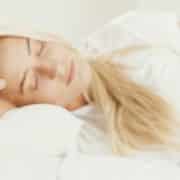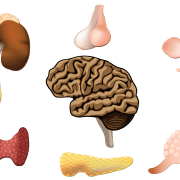Pure Rest™
Get a Good Night’s Sleep with USANA® Pure Rest™ So You Can Rise and Shine
USANA® Pure Rest™
Give your body a boost of melatonin to help support your natural sleep-and-wake cycle.
Your life is full of demands. And showing up—physically, mentally, and emotionally—for whatever’s important in your day starts with getting enough sleep the night before. Not to mention that regularly getting 7-9 hours of sleep a night is essential for your overall health and well-being. If you sometimes need a little help drifting off at night, USANA® Pure Rest™ can help you get to sleep, so you can rise and shine the next morning.*
Pure Rest is a fast-acting melatonin supplement. It supports the body’s natural sleep-and-wake cycles by adding to your natural melatonin production at night. When taken at bedtime, Pure Rest supports the body’s natural circadian rhythms. They signal your body that it’s time to sleep. It’s especially helpful if your normal sleep schedule has been disturbed due to working odd hours or traveling and jet lag.* Pure Rest is not a sleeping pill. It’s non-habit forming. Simply take Pure Rest as part of your bedtime routine to help you get the sleep of your dreams every night.*
Don’t Take a Lack of Sleep Lying Down
Sometimes, when life gets demanding, you just aren’t going to get enough sleep. And if you occasionally find yourself struggling to fall asleep, it’s time to take action.
Running on too few hours of sleep won’t just leave you tired, grumpy, and mentally foggy. Even one night of sleep deprivation may have mental and physical consequences for your daily well-being.
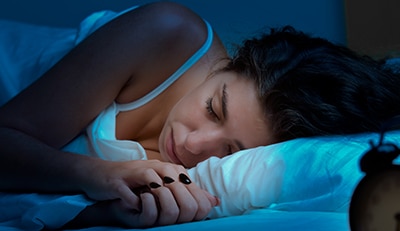
Unfortunately, if you’re in need of more pillow time, you’re not alone. Millions of people need more sleep. It’s become so common that it’s the new “normal.” But not getting enough sleep isn’t something you can relax about. It’s actually considered a growing, unmet health problem by the Institute of Medicine. And with good reason.
Sleep quality supports a number of aspects of health:
- Restoring the body after daily stress and exposure to free radicals*
- Immune function *
- Tissue repair (including joints) and healthy muscle growth*
- Fitness recovery*
- Cardiovascular health*
- Maintaining healthy blood glucose levels (as long as they’re already in the normal range)*
- Appetite, dietary intake, and weight*
- Normal cognitive function and mood*
- Vision*
- Skin appearance*
Getting enough quality sleep will not only help you feel energized and productive. It will also help undo some of the effects of daily wear and tear on your body and increase your odds of living a healthier life.*
The goal? The National Sleep Foundation suggests adults aim to regularly get 7-9 hours of sleep a night. This is based on a rigorous scientific review of studies that related sleep duration to health, performance, and safety. The panel of experts found that those who sleep, on average, less than six hours a night may experience greater impacts to their well-being than those who average seven to eight hours a night.*
The Rhythm of the Night
Your sleep cycle is controlled by your internal biological clock, known as circadian rhythms. This 24-hour cycle regulates a number of bodily functions, including telling your body when it should be asleep and awake. Circadian rhythms are a natural process within your body, but they can be influenced by outside factors.
A number of things can disrupt your sleep cycle (or sleep quality):
- Stress
- Working night shifts
- Traveling across time zones
- Artificial lighting (including LED light bulbs and the blue light coming from your smart phone or other electronic devices)
- Alcohol or drug consumption
- Age (melatonin levels may naturally drop, and you’ll tend to experience more sleep disturbances)
Make regularly getting your ZZZ’s a priority. Daily exercise; limited use of electronic devices and light exposure before bed; and a comfortable, dark sleep environment can all help you get good quality sleep. You can also support a good snooze by giving your natural circadian rhythms added support with a boost of melatonin.
Support Your Sleep to Sustain Your Health with USANA Pure Rest
Melatonin is the key to getting to sleep. This naturally occurring hormone is produced primarily in the pineal gland in your brain. Regulating normal sleep-and-wake cycles is melatonin’s main job. During the day, your body doesn’t make melatonin. Then levels naturally start to rise in the evening. Melatonin levels remain elevated for most of the night, signaling to your body that it is time to sleep.
To boost melatonin from plant-based sources, try adding tomatoes, olives, walnuts, or strawberries to your diet. Or, you can add tryptophan, which is an essential amino acid that your body uses to make melatonin. Tryptophan is found in eggs, poultry, dairy products, chickpeas, and almonds.
Get truly reliable levels of melatonin to help mimic the activity of your natural, sleep-inducing hormone with USANA Pure Rest. Each sugar-free, orange-flavored tablet contains 2 milligrams (mg) of pure melatonin from non-animal sources. And the tablet is scored, so you can easily break it in half to adjust the dosage to fit your needs.*
Taken about an hour before bedtime, Pure Rest will help your melatonin levels increase gradually. As melatonin levels rise, you will become less alert, feel drowsy, and eventually fall asleep. It’s a healthy way to support sleep without experiencing harsh side effects. But you’ll want to take Pure Rest at least five hours before you need to wake up, to help ensure you’ll feel refreshed and focused the next day.*
If you’re worried about a lack of sleep ruining your vacation or making you groggy on a business trip, Pure Rest should be your travel companion. It may help reduce jet-lag when traveling, especially if you’re headed east or across two or more time zones. A dose of approximately 5 mg has been shown to be most effective when crossing many time zones.*
To all you night owls: Supplementing your melatonin with Pure Rest could be especially important if you are exposed to artificial light at night, while it’s dark outside. Light exposure can upset your circadian rhythms and suppress the natural release of melatonin. So, your body will think it’s still time to be productive and make it harder for you to sleep. Pure Rest can help sync your body with the natural light–dark cycle to support a more natural sleep pattern.*
Pure Rest also protects your health at the cellular level while it helps you sleep. Melatonin can act as a free-radical scavenger. Plus, it helps support your body’s own natural antioxidant enzymes. So, by defending against cell-damaging oxidative stress, Pure Rest offers even more benefits for the restorative processes your body undergoes while asleep.*
Usage
Adults take 1/2 to 2 dissolvable tablets, as needed, one hour before bedtime for relief of occasional sleeplessness.
Insomnia may be a symptom of serious underlying medical illness. Keep out of reach of children. Consult your physician if you are pregnant, nursing, taking a prescription drug, or have a medical condition. Do not drive or operate machinery when taking melatonin.
Ideal For
- Adults who need help supporting their normal sleep-and-wake cycle
- Travelers
- Anyone who needs to reset his or her sleep schedule
Frequently Asked Questions About Pure Rest
Who should use Pure Rest?
Pure Rest is designed for adults interested in improving the quality of their sleep, as well as those who appreciate the link between quality sleep and overall health. Because melatonin production and sleep quality generally decline with age, melatonin supplements also tend to be popular with individuals over the age of 50.
A number of studies confirm melatonin as an effective way to address jet lag. As such, it is a popular choice for individuals who travel extensively.*
When should I take Pure Rest?
Don’t take it too early or it’ll make you fall asleep! Pure Rest will work most effectively if you take it about an hour before you go to bed. The orange-flavored tablet will dissolve in your mouth without water.
References
Circadian Rhythms. National Institutes of General Medical Sciences. [Internet] [accessed 30 May 2018] Available at https://www.nigms.nih.gov/education/pages/Factsheet_CircadianRhythms.aspx
Han KS, Kim L, Shim I. 2012. Stress and sleep disorder. Exp Neurobiol 21(4): 141-150.
Czeisler CA. 2013. Perspective: casting light on sleep deficiency. Nature 497(7450): S13.
Xie Z, et al. 2017. A review of sleep disorders and melatonin. Neurol Res 39(6): 559-565.
- Sleep Disorders and Sleep Deprivation: An Unmet Public Health Problem. Institute of Medicine Committee on Sleep Medicine and Research [Internet] [accessed 30 May 2018] Available at https://www.ncbi.nlm.nih.gov/books/NBK19961/
Copinshi G. 2005. Metabolic and endocrine effects of sleep deprivation.
Ess Psycopharm 6(6): 341-7. {also MEMORY}
Watson, AM. 2017. Sleep and athletic performance. Curr Sports Med Rep 16(6): 413-418.
National Sleep Foundation. What Happens When You Sleep?
Mayo Clinic. Is melatonin a helpful sleep aid – and what should I know about melatonin side effects?
You May Also Enjoy
The Science of Slumber: Sleep and Health
Sleep is important for optimal physical and mental function to carry you through your day. Find out how sleep and health are connected. And learn the science of sleep.
Circadian Rhythms Drive Your Health
Circadian rhythms are a set biological processes that your body goes through every day. Discover how they affect your mental and physical health.
All About Hormones: How They Function to Keep You Healthy
The body is full of different types of hormones that help keep you healthy. Learn more about your helpful hormones.
*These statements have not been evaluated by the Food & Drug Administration. This product is not intended to diagnose, treat, cure, or prevent any disease.


